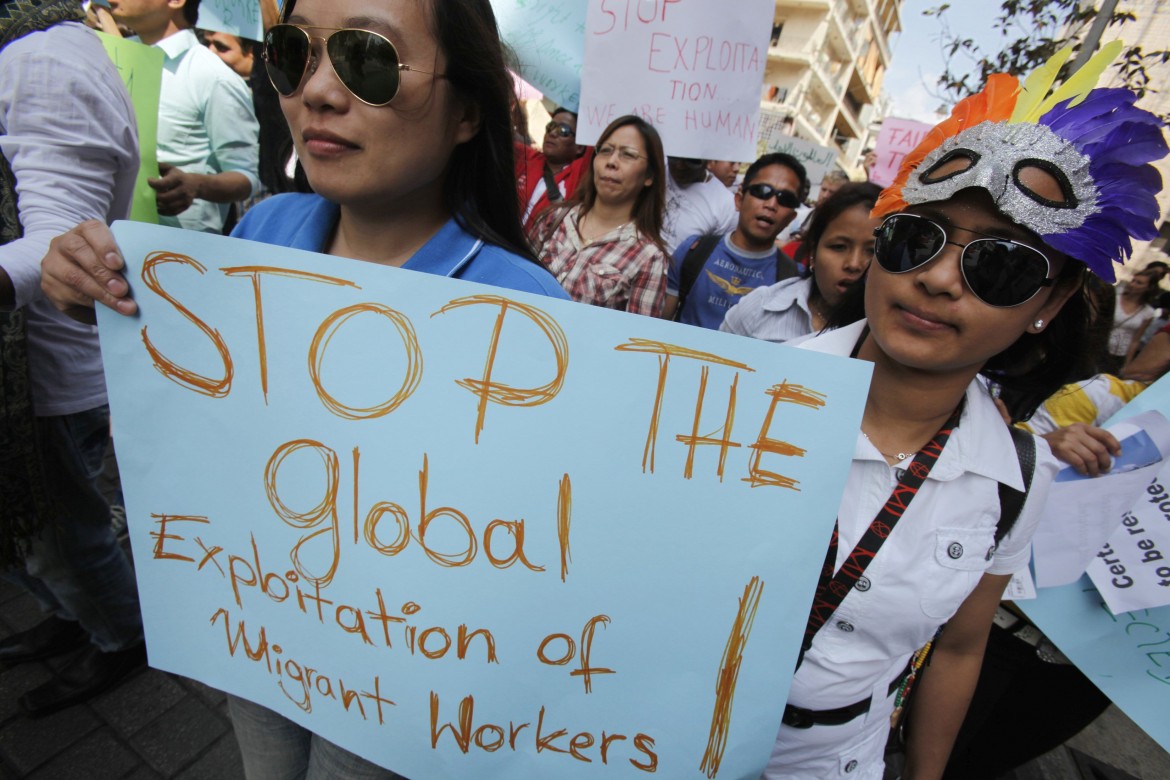Analysis
Domestic workers are modern slaves of the Middle East
Two domestic workers die every week in Lebanon from unnatural causes, often by suicide. Trapped in the home, abused and oppressed by the “kalafa” system of sponsorship.

The data may come as a surprise: The Middle East is the region with the highest percentage of female domestic workers, and almost all of them are migrants. In the Gulf and Levant, the International Labor Organization estimates there are 1.6 million workers; the International Trade Union Confederation estimate is nearly twice as high (2.5 million).
The monitoring site Migrant Rights contextualizes these huge numbers. Ninety percent of Kuwaiti citizens employs a foreign domestic worker; 36.6 percent of the female workforce is employed in private homes in Bahrain; 99.6 percent of economic immigrants in Saudi Arabia are domestic workers.
The other side of the coin is these workers’ total absence of rights: They work on average 64 hours a week and earn between 20 percent and 30 percent less than the national minimum wage ($147 a month in Kuwait and $100 in Saudi Arabia).
They are victims of an invisible form of modern slavery. Keeping them in place is the kafala system, or sponsorship system. In Gulf states and Lebanon, residence is permitted on the basis of sponsorship by a citizen or private company — in effect the “owners” of a human being.
Their passports are confiscated, they’re unable to look for a more decent or better paying job, and they suffer inhuman working conditions and physical and verbal abuse. Suicides are one of the direct consequences for these workers, virtually all of whom are from Southeast Asia and Sub-Saharan Africa.
The government’s lack of regulation makes everything worse. Domestic work is excluded from labor laws, apparently so as not to violate the privacy or “sanctity” of the home.
Domestic workers end up in limbo: invisible, divided from each other and unable to access their consulates. They either continue to work or risk arrest and deportation. Human trafficking networks profit in the background, with specialist agencies who profit from the illegal “sale” of female migrants.
While unions and strikes are outlawed in the Gulf petromonarchies, the earliest forms of trade union organization are taking root in Lebanon. In 2015, the first union of domestic workers was formed under the umbrella of the larger federation of workers’ unions. It has since signed agreements with unions in the workers’ countries of origin and launched campaigns to gain government recognition, backed by 100 local NGOs.
But difficulties abound. It’s a challenge to reach individual workers for reasons of language, isolation, low salaries that restrict movement and the fear of deportation. And now there’s a new conflict brewing among the poor themselves, triggered by the arrival of hundreds of thousands of Syrian refugees willing to work for lower wages. But Lebanese civil society and anti-racist movements have made the conditions of domestic workers their banner cause.
In 2011, a migrant community center opened in Beirut, and on May 1 a parade of migrant workers filled the streets of the capital under the slogan, “Kafala kills.” Just a few months earlier, in November, Lebanon deported Sujana Rana Roja Limbu, a domestic worker and leader of a union created two years ago that’s still illegal in Beirut.
Meanwhile, it’s total oblivion in the Gulf, where the narrative underpinning the Sunni petromonarchies — Wahhabism, the medieval interpretation of Islam that suffocates any “minority” believed to be a threat to the regime (women, immigrants, Shiites, the political opposition) — creates a physical and mental cage around migrants.
Exploitation of workers in the home is deeply rooted and widespread, not treated at all by the media and marginalized by the authorities who never punish those responsible for crimes in the rare cases reported by victims.
This explains the dramatic Lebanese intelligence statistics published in the news agency IRIN. Every week in Lebanon, two domestic workers die from unnatural causes: beatings, suicides or falls from balconies in an attempt to escape.
Originally published at https://ilmanifesto.it/la-schiavitu-invisibile-delle-migranti-abusi-tratta-e-passaporti-confiscati/ on 2017-06-18
